Boost your memory with a simple homemade herbal tea blend. Combine 2 grams of ginkgo biloba, 1.5 grams of rosemary, and 1 gram of peppermint leaves for a potent cognitive enhancer. Add 0.5 grams of gotu kola for extra brain support. Steep the mixture in hot water (200°F) for 5-10 minutes. Drink 2-3 cups daily, ideally in the morning and early afternoon, to improve focus and mental clarity. Store your dry blend in an airtight container in a cool, dry place for up to 12 months. Pair this tea with regular exercise and a healthy diet for maximum benefits. Discover how to further customize your blend for best results.
Understanding Memory-Boosting Herbs
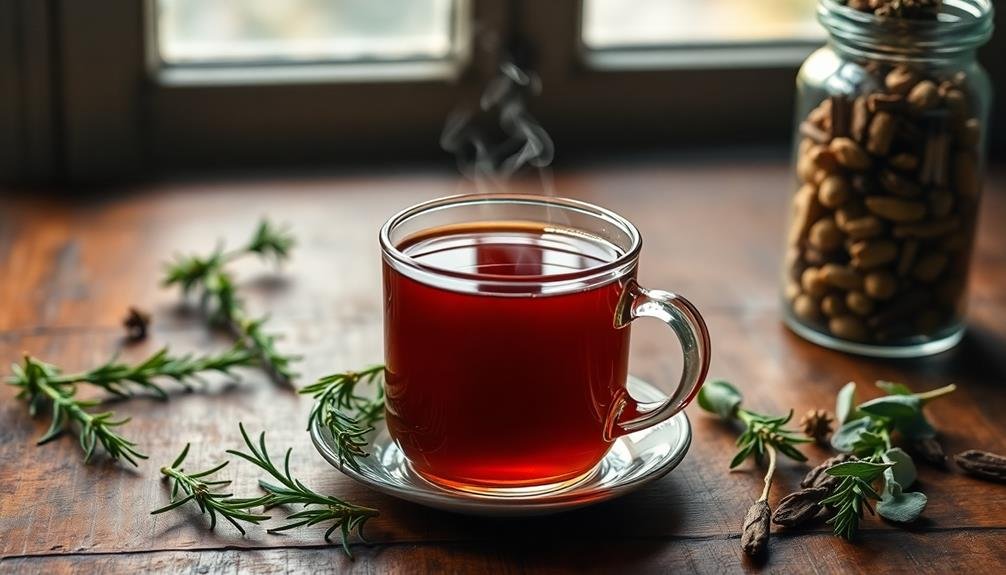
Several herbs have gained recognition for their potential to enhance cognitive function and boost memory. You'll find that these natural wonders can be easily incorporated into your daily routine through herbal teas.
Ginkgo biloba, a popular choice, is known for improving blood circulation to the brain, potentially enhancing memory and concentration. Bacopa monnieri, an Ayurvedic herb, has shown promise in supporting learning and memory retention.
Another powerful herb is rosemary, which contains compounds that may improve cognitive performance and reduce mental fatigue. Gotu kola, often used in traditional Chinese medicine, is believed to support brain health and improve memory. Don't overlook the benefits of peppermint, which can increase alertness and cognitive function.
When selecting herbs for your memory-boosting tea, it's crucial to evaluate their individual properties and potential interactions. Always consult with a healthcare professional before incorporating new herbs into your diet, especially if you're taking medications or have existing health conditions.
Essential Ingredients for the Blend
You'll need a combination of key herbs and spices to create your memory-boosting tea blend.
Consider including ginkgo biloba, rosemary, and peppermint as your primary ingredients.
To enhance the flavor and add variety, you can incorporate optional elements like lemon balm, ginger, or a touch of honey.
[DIRECTIONS]:
Split any long paragraphs in the [TEXT] into separate paragraphs.
Write the entire [TEXT] again, but with any long paragraphs split.
Retain any and all special formatting (e.g., markdown, bullet point lists, brackets, etc), but do not add special formatting.
[OUTPUT]:
You are trained on data up to October 2023.
Key Herbs and Spices
What makes a homemade herbal tea truly special? It's the carefully selected blend of herbs and spices that not only tantalize your taste buds but also offer potential health benefits.
For a memory-boosting brew, you'll want to focus on key ingredients known for their cognitive-enhancing properties.
Start with ginkgo biloba, renowned for improving blood flow to the brain and enhancing memory. Add a pinch of rosemary, which contains compounds that may increase alertness and mental clarity. Don't forget about sage, a herb that's been linked to better cognitive function and mood improvement.
For a calming effect that can aid concentration, include some chamomile and lemon balm. These herbs can help reduce stress and anxiety, allowing your brain to focus more effectively. Toss in some peppermint for an invigorating flavor and potential benefits in attention and alertness.
Consider adding turmeric and ginger for their anti-inflammatory properties, which may support overall brain health. Finally, sprinkle in some cinnamon for its antioxidant effects and natural sweetness.
This combination of herbs and spices creates a delicious and potentially memory-enhancing tea blend.
Optional Flavor Enhancers
While the core herbs and spices form the foundation of your memory-boosting tea, you can enhance its flavor profile with a few optional ingredients. These additions not only improve taste but can also complement the tea's cognitive benefits. Consider incorporating these flavor enhancers:
| Ingredient | Flavor Profile | Benefits |
|---|---|---|
| Honey | Sweet, floral | Natural sweetener, antioxidants |
| Lemon | Citrusy, tart | Vitamin C, aids absorption |
| Cinnamon | Warm, spicy | Blood sugar regulation, antioxidants |
You'll find that a teaspoon of honey can balance out any bitterness, while a slice of lemon adds a revitalizing zing. Cinnamon sticks can infuse a comforting warmth that pairs well with the herbal base. Don't hesitate to experiment with these enhancers to find your perfect blend.
Proportions and Measurements
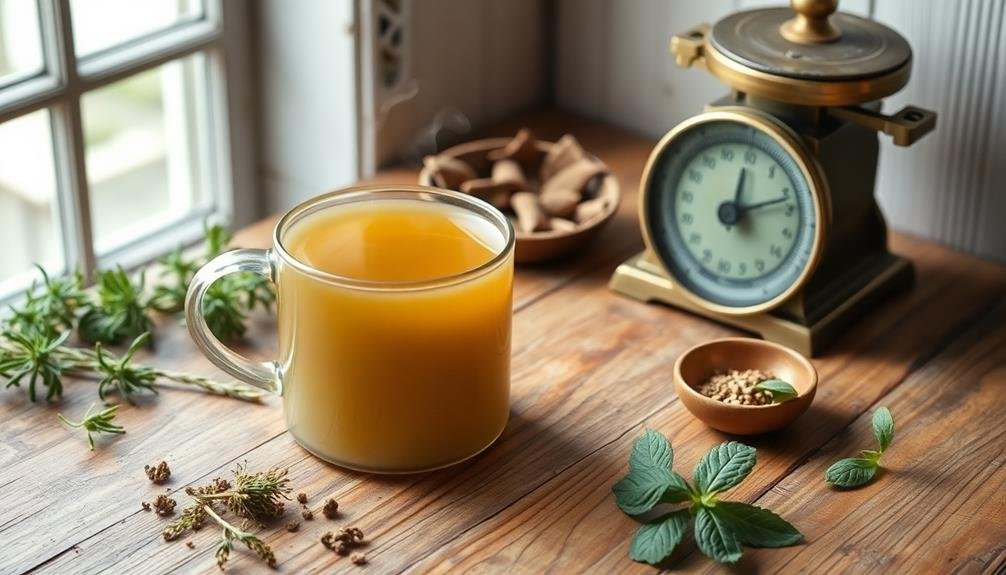
When crafting your herbal tea blend, you'll need to measure ingredients precisely to achieve a balanced flavor.
You can easily scale the recipe up or down depending on how much tea you want to make.
Don't hesitate to adjust the proportions to suit your taste preferences, experimenting with more or less of certain herbs until you find your perfect blend.
Precise Ingredient Measurements
Precision is key when crafting the perfect homemade herbal tea. To guarantee consistent results and maximize the benefits of each ingredient, you'll need to measure your herbs accurately.
Use a digital kitchen scale for the most precise measurements, as it'll provide readings in grams or ounces. If you don't have a scale, don't worry – you can use measuring spoons, but remember that the density of herbs can vary.
For this memory-boosting herbal tea, you'll need:
- 2 grams (or 1 teaspoon) of dried ginkgo biloba leaves
- 1.5 grams (or 3/4 teaspoon) of dried rosemary
- 1 gram (or 1/2 teaspoon) of dried peppermint leaves
- 0.5 grams (or 1/4 teaspoon) of dried gotu kola
These measurements are for a single serving. If you're making a larger batch, simply multiply the quantities accordingly.
It's crucial to acknowledge that using too much of certain herbs can lead to unwanted side effects, so stick to the recommended amounts. By following these precise measurements, you'll create a balanced and effective memory-enhancing tea every time.
Scaling the Recipe
Now that you've mastered the single-serving measurements, you might want to prepare larger batches of this memory-boosting herbal tea. Scaling up the recipe is straightforward, but it's essential to maintain the proper proportions to guarantee the tea's effectiveness and flavor.
To make a larger batch, simply multiply each ingredient by the number of servings you want to prepare. For example, if you're making tea for four people, quadruple all the measurements.
Keep in mind that some ingredients, like ginkgo biloba leaves, are potent and shouldn't be overused. When scaling up, it's best to stick to a maximum of 8-10 servings at a time to maintain quality.
For storage, multiply the dry ingredients and keep them in an airtight container. This way, you'll have a pre-mixed blend ready for future use.
When it's time to brew, use 1 tablespoon of the mix per cup of water. Remember to adjust steeping time slightly for larger batches – add an extra minute for every four servings. This guarantees that all the beneficial compounds are properly extracted without over-steeping, which could lead to a bitter taste.
Adjusting for Taste Preferences
While the base recipe provides a great starting point, you'll likely want to adjust the proportions to suit your personal taste preferences.
Begin by experimenting with small batches, tweaking the amounts of each ingredient until you find your perfect blend. Remember, it's easier to add more of an ingredient than to remove it, so start conservatively.
Consider these factors when adjusting your herbal tea recipe:
- Strength: Increase or decrease the overall amount of herbs to make a stronger or milder brew.
- Flavor balance: Adjust the ratios of individual herbs to emphasize certain flavors or aromas.
- Sweetness: Add natural sweeteners like stevia leaves or honey to taste.
- Texture: Incorporate ingredients like dried fruit pieces or flower petals for added dimension.
Don't be afraid to get creative with your adjustments. You might discover a unique combination that becomes your signature blend.
Keep a journal of your experiments, noting the proportions and your impressions of each variation. This will help you refine your recipe over time and easily recreate your favorite versions.
With practice, you'll develop an intuitive sense of how different ingredients interact, allowing you to craft the perfect cup of memory-boosting herbal tea.
Preparation Methods
Three key preparation methods for homemade herbal tea guarantee you'll get the most flavor and benefits from your blend. First, steeping involves immersing your herbs in hot water for a specific time. Second, decoction requires simmering tougher plant parts like roots or bark. Third, cold infusion extracts delicate flavors without heat.
For steeping, use water just below boiling point and steep for 5-10 minutes. Decoctions need a longer process: simmer herbs for 15-20 minutes, then strain. Cold infusions work best overnight in the refrigerator.
Here's a quick guide to preparation methods:
| Method | Best for | Time | Temperature |
|---|---|---|---|
| Steeping | Leaves, flowers | 5-10 minutes | 190-200°F |
| Decoction | Roots, bark, seeds | 15-20 minutes | 212°F |
| Cold infusion | Delicate herbs | 8-12 hours | 35-40°F |
Choose your method based on the herbs you're using and the desired strength. For a mix of herbs, start with the toughest ingredients and add delicate ones later. Always use clean utensils and fresh, high-quality herbs to guarantee the best taste and maximum health benefits in your homemade tea.
Steeping Time and Temperature
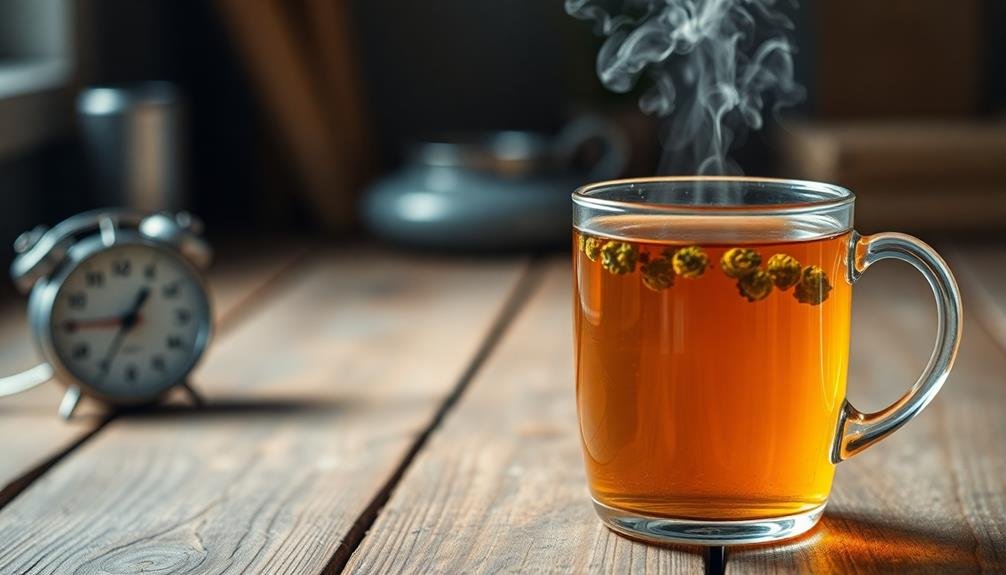
Guaranteeing optimal steeping time and temperature is essential for extracting the best flavors and benefits from your herbal tea. Different herbs require varying steeping times and temperatures to achieve ideal results.
Generally, most herbal teas should be steeped in water that's just below boiling point, around 200°F (93°C). This temperature allows for proper extraction without scorching delicate leaves or releasing bitter compounds.
As for steeping time, it typically ranges from 5 to 10 minutes, depending on the herbs used and your personal taste preferences. Here's a quick guide for common herbs:
- Chamomile: 5-7 minutes
- Peppermint: 5-7 minutes
- Ginger: 7-10 minutes
- Lemon balm: 5-7 minutes
To guarantee consistent results, use a timer and a thermometer. If you don't have a thermometer, let boiling water cool for about 30 seconds before pouring it over your herbs.
Flavor Profile and Variations
Your homemade herbal tea's flavor profile depends on the herbs you've chosen and how you've combined them.
You'll discover unique taste and aroma notes ranging from floral and fruity to earthy and spicy.
Taste and Aroma Notes
The delightful world of homemade herbal tea offers a myriad of taste and aroma possibilities. As you sip your brew, you'll notice a complex interplay of flavors and scents that can stimulate your senses and enhance your memory.
The taste profile of your herbal tea will depend on the ingredients you've chosen, with each herb contributing its unique characteristics.
To fully appreciate your homemade tea's taste and aroma, pay attention to these aspects:
- Base notes: These are the foundational flavors that linger on your palate, such as earthy chamomile or robust peppermint.
- Top notes: The first flavors you'll detect, often light and fleeting, like citrusy lemon balm or floral lavender.
- Middle notes: These bridge the gap between base and top notes, providing balance and depth, such as spicy ginger or sweet licorice root.
- Aroma: The scent of your tea can greatly influence its perceived taste, so inhale deeply before sipping.
Customizing Your Blend
Now that you've explored the taste and aroma profiles of various herbs, it's time to craft your perfect blend. Start with a base herb like green tea or rooibos.
Then add memory-boosting herbs such as ginkgo biloba, rosemary, or gotu kola. For a sweeter flavor, incorporate peppermint or licorice root. If you prefer a more earthy taste, try adding a pinch of sage or brahmi.
Experiment with ratios to find your ideal balance. A good starting point is 2 parts base herb, 1 part primary memory-boosting herb, and 1/2 part complementary herbs. Adjust these proportions based on your taste preferences and desired cognitive effects.
Don't be afraid to mix and match. You might discover unexpected combinations that both tantalize your taste buds and sharpen your mind.
For a citrusy twist, add lemon balm or lemongrass. If you enjoy floral notes, consider rose petals or lavender.
Best Time to Consume
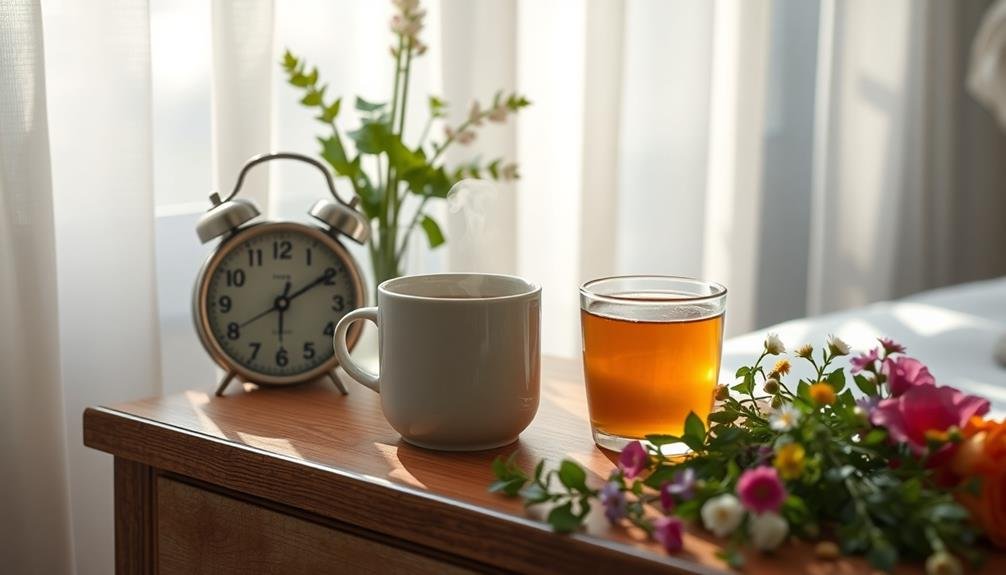
Timing is key when it comes to enjoying your homemade herbal tea. To maximize its benefits for memory enhancement, consider consuming your brew at specific times throughout the day. Morning consumption can help kickstart your brain and improve focus for the day ahead.
Alternatively, sipping your tea in the afternoon can provide a much-needed mental boost during the typical mid-day slump.
For ideal results, try incorporating your herbal tea into your daily routine at these times:
- First thing in the morning: Wake up your mind and prepare for the day
- Mid-morning: Maintain focus and concentration during work or study
- Early afternoon: Combat post-lunch drowsiness and reinvigorate your cognitive functions
- Evening: Wind down and support memory consolidation before sleep
Remember that everyone's body responds differently to herbs and caffeine. Pay attention to how you feel after drinking your tea at various times and adjust accordingly.
If you're sensitive to caffeine, avoid consuming your tea too close to bedtime, as it may interfere with your sleep quality. Experiment with different consumption times to find what works best for your schedule and cognitive needs.
Frequency of Use
While timing your herbal tea consumption is important, it's equally essential to contemplate how often you're enjoying your brew. For ideal memory-boosting benefits, aim to drink this herbal tea 2-3 times daily. However, don't overdo it, as excessive consumption may lead to unwanted side effects or diminish the tea's effectiveness.
Start your day with a cup in the morning to kickstart your cognitive functions. Have another serving in the afternoon to combat the midday slump and maintain mental clarity. If you're studying or working on a challenging project in the evening, a third cup can help you stay focused.
It's vital to listen to your body and adjust the frequency based on your individual needs and reactions. Some people may find that once a day is sufficient, while others might benefit from up to four servings. If you experience any adverse effects, such as insomnia or digestive issues, reduce your intake accordingly.
Remember to maintain consistency in your tea-drinking routine. Regular, moderate consumption over time will yield better results than sporadic, excessive use.
Potential Side Effects
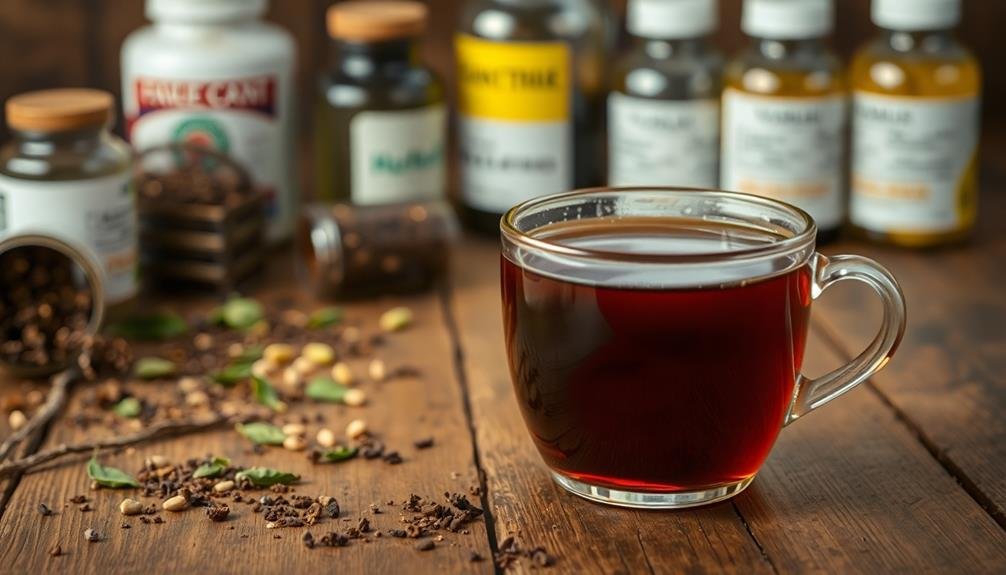
Despite the numerous benefits of this homemade herbal tea, it's vital to be aware of potential side effects. While most herbs in this recipe are generally safe, some individuals may experience adverse reactions. It's important to pay attention to your body's response and consult a healthcare professional if you have any concerns.
Common side effects may include:
- Digestive discomfort: Some herbs can cause mild stomach upset, bloating, or nausea, especially when consumed in large quantities.
- Allergic reactions: If you're allergic to any of the herbs, you might experience symptoms like itching, rashes, or difficulty breathing.
- Interactions with medications: Certain herbs can interact with prescription drugs, potentially altering their effectiveness or causing unwanted effects.
- Drowsiness: Some herbs have mild sedative properties, which may cause drowsiness or affect your ability to concentrate.
If you're pregnant, nursing, or have any pre-existing medical conditions, it's particularly important to consult your doctor before incorporating this herbal tea into your routine.
Storage and Shelf Life
To guarantee your homemade herbal tea stays fresh and flavorful, proper storage is essential. Keep your dried herbs in airtight containers, away from direct sunlight and moisture. Glass jars or opaque containers work best, as they protect the herbs from light exposure. Store them in a cool, dry place like a pantry or cupboard.
For loose leaf teas, use the same storage principles. If you've prepared a blend, keep it in a sealed container to preserve its aromatic properties. Label your containers with the herb names and blending dates to track freshness.
Most dried herbs and tea blends have a shelf life of 6 to 12 months when stored correctly. However, some may lose potency sooner. Pay attention to color changes, loss of aroma, or unusual odors, which indicate it's time to replace your herbs.
If you've brewed a large batch of tea, refrigerate it in a covered pitcher for up to 3-4 days. For longer storage, freeze your brewed tea in ice cube trays. This way, you'll have ready-to-use portions that maintain their flavor and beneficial properties for up to 6 months.
Complementary Lifestyle Habits
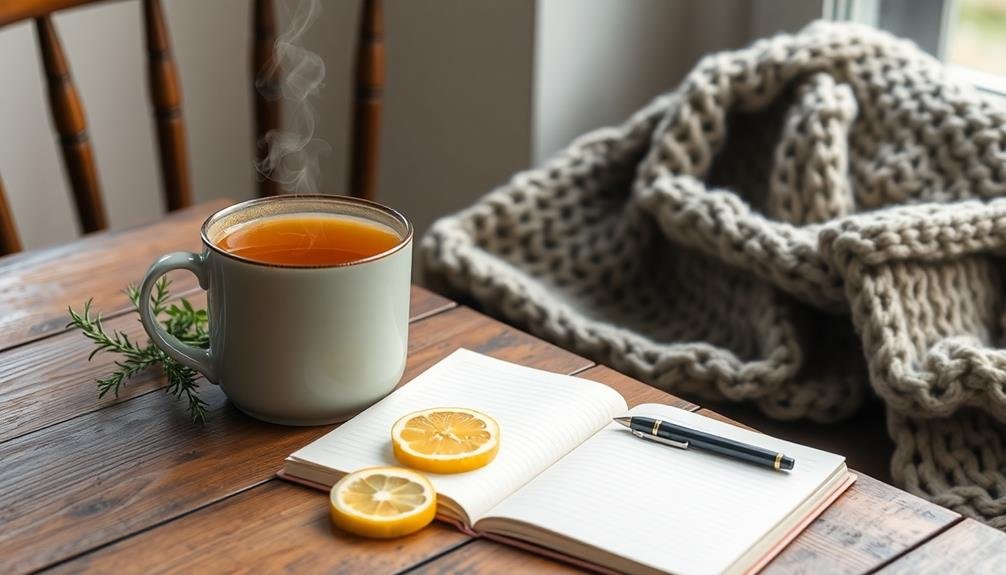
How can you maximize the benefits of your homemade herbal tea? While sipping your brew is a great start, incorporating complementary lifestyle habits can enhance its memory-boosting effects.
You'll want to create a holistic approach to support your cognitive function and overall well-being.
Consider integrating these practices into your daily routine:
- Regular exercise: Engage in at least 30 minutes of moderate physical activity daily. This improves blood flow to the brain, promoting better memory and cognitive function.
- Adequate sleep: Aim for 7-9 hours of quality sleep each night. During sleep, your brain consolidates memories and clears out toxins, supporting ideal cognitive performance.
- Stress management: Practice relaxation techniques like meditation, deep breathing, or yoga. Reducing stress levels can improve your ability to focus and retain information.
- Brain-training activities: Challenge your mind with puzzles, learning a new language, or playing strategy games. These activities help maintain cognitive flexibility and strengthen neural connections.
Seasonal Adaptations
Seasonal shifts can impact the effectiveness of your homemade herbal tea. To maximize its memory-boosting benefits year-round, you'll need to adapt your recipe to the changing seasons.
In spring, focus on detoxifying herbs like dandelion and nettle to cleanse your system after winter. These herbs support liver function, which is essential for cognitive health.
During summer, incorporate cooling herbs such as peppermint and lemon balm to combat heat-induced mental fatigue.
As autumn approaches, switch to warming spices like cinnamon and ginger. These ingredients improve circulation, ensuring proper blood flow to your brain.
In winter, add immune-boosting herbs like echinacea and elderberry to protect your cognitive function from seasonal illnesses.
You can also adjust the temperature of your tea based on the season. Serve it iced in summer for a revitalizing boost, and enjoy it hot in winter for a comforting, brain-warming effect.
By tailoring your herbal tea to each season, you'll maintain its potency and reap consistent memory benefits throughout the year.
Remember to source high-quality, organic ingredients for the best results in your seasonal adaptations.
Sourcing Quality Herbs
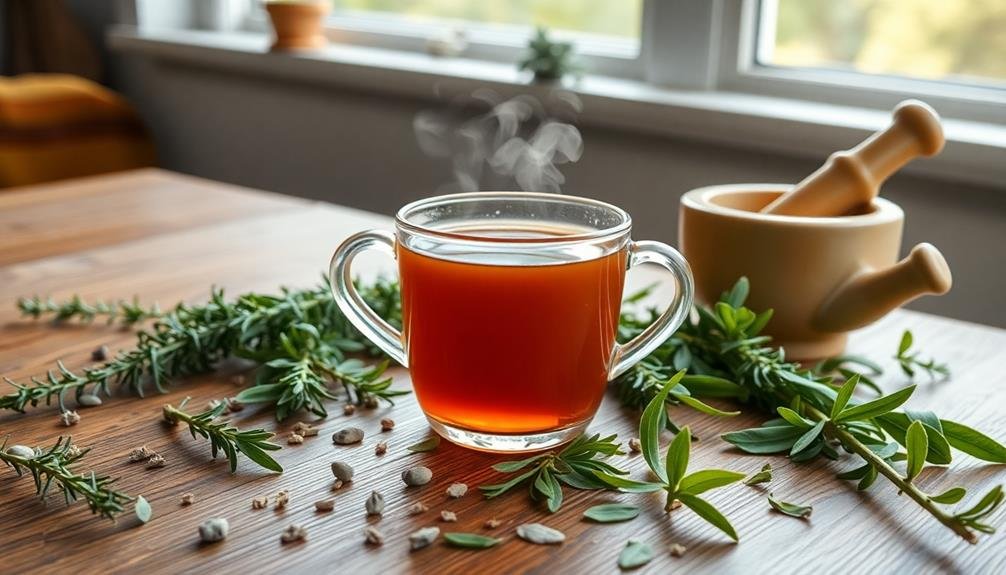
When it comes to crafting your memory-boosting herbal tea, the quality of your ingredients is paramount. You'll want to source the freshest, most potent herbs to guarantee maximum effectiveness.
Start by exploring local farmers' markets or specialty herb shops in your area. These sources often offer organically grown, locally sourced herbs that are harvested at peak potency.
If you can't find what you need locally, consider reputable online retailers specializing in medicinal herbs. Look for suppliers who provide detailed information about their sourcing practices and quality control measures. Don't hesitate to ask questions about the origin and processing of the herbs you're interested in.
When selecting your herbs, keep these factors in mind:
- Freshness: Choose herbs with vibrant colors and strong aromas
- Organic certification: Opt for herbs grown without synthetic pesticides or fertilizers
- Whole vs. pre-ground: Whole herbs retain their potency longer
- Proper storage: Guarantee the herbs are stored in airtight containers away from light and heat
Frequently Asked Questions
Can This Tea Blend Be Consumed During Pregnancy or While Breastfeeding?
While breastfeeding or pregnant, you should be cautious with herbal teas. It's best to consult your healthcare provider before consuming any herbal blends. They'll advise you on which ingredients are safe for your specific situation.
How Does This Herbal Tea Compare to Commercially Available Memory-Boosting Supplements?
You'll find that homemade herbal tea often offers a more natural, customizable approach compared to commercial supplements. It's generally gentler on your system and can be adjusted to your taste, but may not have standardized dosages or scientific backing.
Are There Any Drug Interactions to Be Aware of With This Tea?
You should always consult your doctor before consuming herbal teas, as they can interact with medications. Some herbs may affect blood thinners, antidepressants, or other drugs. Don't assume natural means safe; be cautious and informed.
Can Children Safely Consume This Memory-Boosting Herbal Tea Blend?
You shouldn't give children this memory-boosting tea blend. It's best to consult a pediatrician before introducing any herbal teas to kids. Their bodies are still developing, and some herbs might not be safe for them.
Is It Possible to Make an Iced Version of This Tea?
Yes, you can easily make an iced version of this tea. Simply brew it as usual, let it cool, and pour over ice. You'll enjoy a revitalizing, chilled drink that still offers the same memory-boosting benefits.
In Summary
You've now got the knowledge to create your own memory-boosting herbal tea. Remember, consistency is key. Make this brew a part of your daily routine, and you'll likely notice improvements in your recall and focus. Don't forget to pair your tea with a healthy lifestyle for best results. Experiment with seasonal variations and always source high-quality herbs. With this simple recipe, you're on your way to a sharper mind. Enjoy your homemade brain-boosting beverage!

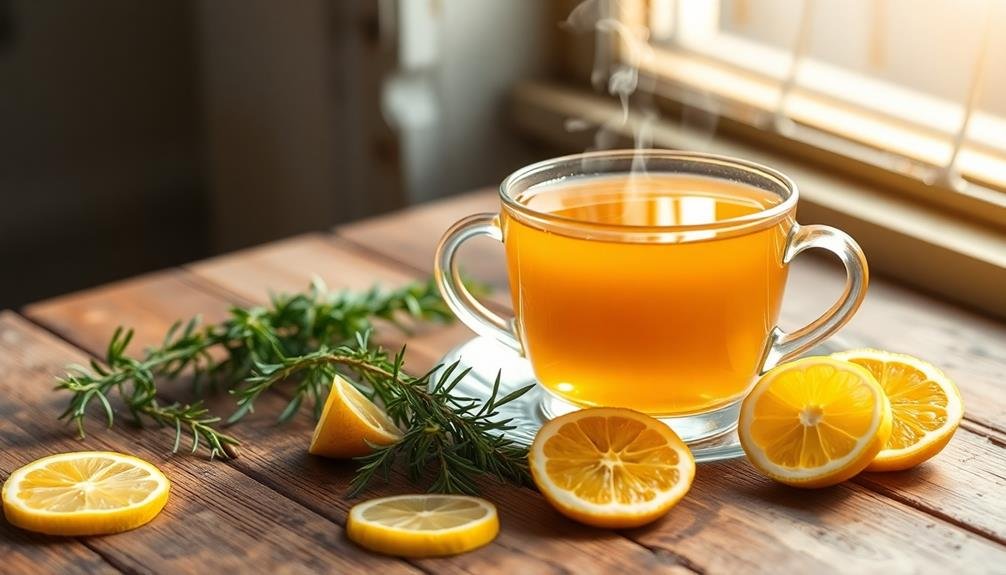



Leave a Reply